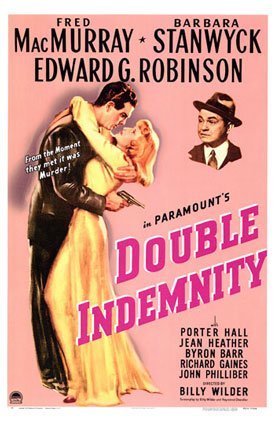
DOUBLE INDEMNITY
US, 1944, 107 minutes, Black and white.
Fred Mac Murray, Barbara Stanwyck, Edward G. Robinson, Tom Powers, Porter Hall, Jean Heather, Byron Barr, Richard Gaines.
Directed by Billy Wilder.
Double Indemnity is one of the Hollywood black thrillers. It received many Oscar nominations in 1944. It was co-written and directed by Billy Wilder, a refugee from Nazi Germany who spent the '30s writing many scripts in Hollywood. His collaborator was frequently Charles Brackett. His first directorial role with the comedy The Major and the Minor. He then made the war film Five Graves To Cairo. The present film was followed by The Lost Weekend, for which he won his first Oscar. His second Oscar was for The Apartment in 1960. Billy Wilder has a rather bleak and sardonic outlook on life - he focuses on the offbeat and sometimes the bizarre. Several of his successful films are: Sunset Boulevard, Ace In The Hole, Stalag 17.
Fred Mac Murray was popular lead in light comedies and romantic dramas in the '30s and '40s. He was cast against his popular image to great effect in this film. Barbara Stanwyck had had a versatile career up till 1944 in all kinds of films. Here she effectively incarnates the evil woman. Edward G. Robinson, who had played many gangster roles, plays the insurance investigator. The film is very effective in involving the audience with the characters, in the perfect crime, in the falling out and the vengeance.
The story is based on factual incidents written up by James M. Cain, author of The Postman Always Rings Twice. Novelist Raymond Chandler collaborated with the screenplay. Originally the film was longer. There were cuts of up to 20 minutes of sequences with Fred Mac Murray going to the gas chamber.
Double Indemnity is a very fine example of the best in Hollywood film-making. There was a television remake with Samantha Eggar and Richard Crenna and Lee J. Cobb, directed by Jack Smight.
1. The classic status of this film? Its particularly American tone and style? The crime drama, detection? The collaboration of Raymond Chandler and Billy Wilder on a James M. Cain story?
2. Black and white photography? The Miklos Rosza score and its atmosphere? The editing for pace and suspense?
3. The standards of the Hays Office at the tine? The presentation of a crime, the leads as initially sympathetic? The demand of the Office that crime not pay? The casting of the stark., audience expectations of them at the time, their playing against these expectations? To what effect?
4. The audience involvement in the screenplay: the initial sequence with Walter Neff speaking to the tape recorder, the flashback and the description of the crime, the ironies? The importance of Neff's talking to the tape and therefore the voice-over technique throughout the film? The voice-over addressed to Keys? The development of the plot and the value
judgments being made throughout? The ironies being highlighted - and yet the final solution not known? The Raymond Chandler style of story and narrative?
5. The significance of the title, the focus on insurance, money and greed? The credits?
6. The portrayal of a crime in detail, the evil of the crime, the motives, the possibility of choice especially for Walter? Phyllis and cold evil? The seduction of Walter? Walter and his weakness, fears, passion and greed? The husband as victim - not sympathetic, wealthy?
7. Fred Mac Murray's character portrayal of Walter: the introduction, the speaking to the tape, the tone with which he addressed Keys? The first person narrative and voice-over? His effectiveness as an insurance man? Weakness, greed - an ordinary worker? The visit to Phyllis, the attraction and his description of her? The subsequent visits and allowing himself to be led on? The tentative discussions about policies, the possibility of murder? Walter's attitude towards Dietrichson? Lola? The deeper involvement, the discussion about policies and his knowledge, the artifice for getting the signatures? The plan and the tensions? The car and the timing, the train trip, Walter's disguise? The pushing of Diedrichson and carrying him through the plan? The effect after the crime? Phyllis and her coolness? Lola and her anxiety? Nino and the truth? The build-up to the confrontation with Phyllis, her intent to kill him, his killing her? The portrait of an ordinary weak man, his death and the possibility of assessing his life?
8. Barbara Stanwyck's style as Phyllis? Blonde, cool? The explanations of her past and marriage to Diedrichson, Lola’s suspicion? Lola’s antagonism? Her smooth talking, her wiles, seduction? Passionate involvement? Her work with Walter for getting the signature, taking out the policies? Making the plans? Her lies? The effect of the death? Nino? The final confrontation with Walter and her death? A personification of evil with no redeeming features?
9. Diedrichson: the wealthy type, his manner, business background, brusqueness, signing his death warrant, the murder? The lack of audience sympathy - and therefore not so much blame for Phyllis and Walter?
10. Lola and her love for her father, her genuine concern, suspicions of Phyllis? The humane aspect of the family?
11. The attention to detail, signatures, time, the train and the dropping of the body, the irony of Walter being seen? The suspense with the car and the ignition not starting etc.? How well did the film blend character study and suspense?
12. Edward G. Robinson's portrait of Keys: his efficient work, friendship with Walter, his comments on his behaviour, his theories about the murder, the seeking of evidence? The interviews with the witness? (The comic touches with the witness and his being brought south, the possibility of identifying Walter?), his following Walter, the final confrontation?
13. The fascination and appeal of looking at the perfect crime? A portrayal of evil, weakness? Victim? The perfect crime and the falling out of criminals - mutual betrayal? Why is the film a classic of its kind?